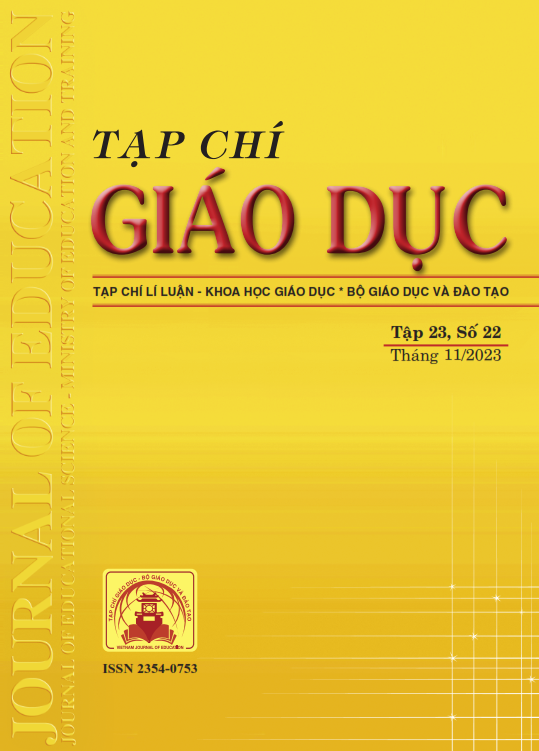Dạy học chủ đề “Năng lượng tái tạo” (Vật lí 11) theo định hướng giáo dục STEMS nhằm phát triển năng lực khoa học cho học sinh
- Từ khóa:
- STEM Education
- STEMS
- Scientific Competency
- Physics
Tóm tắt
STEMS education and learners’ competency and quality-based teaching, including scientific competence, have attracted great interest from many teachers and researchers. Is it possible to develop scientific capability through STEMS education? To address this question, the research study proposed a lesson plan to teach the topic “Renewable Energy” (Physics 11). The author employed a combination of literature review methods, expert opinion collection, and mathematical statistics. With 10 questions designed based on a 5-point Likert scale, 82 collected responses ensured the conditions for analysis. The results showed that the lesson plan on the topic “Renewable Energy”, which consists of 2 periods with 8 activities, was considered as a STEMS lesson and thus helped the students develop their scientific capability. The research serves as a reference for school teachers and experts to consult and deploy extensively with other topics and other subjects.
Tài liệu tham khảo
Bộ GD-ĐT (2020). Công văn số 3089/BGDĐT-GDTrH ngày 14/8/2020 về việc triển khai thực hiện giáo dục STEM trong giáo dục trung học.
Bộ GD-ĐT (2021). Bình đẳng giới ngành Giáo dục phải thực chất, hiệu quả, tránh hình thức. https://moet.gov.vn/
UserControls/Publishing/News/BinhLuan/pFormPrint.aspx?UrlListProcess=/content/tintuc/Lists/News&ListId=&SiteId=&ItemID=7295&SiteRootID=&isEn=False
Bybee, R. W. (2013). The case for STEM education: Challenges and opportunities. National Science Teachers Association.
Epstein, D., & Miller, R. T. (2011). Slow off the mark: Elementary school teachers and the crisis in science, technology, engineering, and math education. Center for American Progress. https://eric.ed.gov/?id=ED536070
Hán Thị Hương Thuỷ, Đỗ Hương Trà (2023). Tổ chức dạy học dựa trên vấn đề bài học STEM “hiện tượng bay hơi và ngưng tụ” (Khoa học tự nhiên 6) nhằm phát triển năng lực khoa học tự nhiên cho học sinh. Tạp chí Giáo dục, 23(13), 29-35.
Hu, J., & Yu, R. (2021). The effects of ICT-based social media on adolescents' digital reading performance: a longitudinal study of PISA 2009, PISA 2012, PISA 2015 and PISA 2018. Computers & Education, 175, 104342. https://www.sciencedirect.com/science/article/pii/S0360131521002190
Kelley, T. R., & Knowles, J. G. (2016). A conceptual framework for integrated STEM education. International Journal of STEM Education, 3(1), 1-11. https://link.springer.com/article/10.1186/s40594-016-0046-z
Kennedy, T. J., & Odell, M. R. (2014). Engaging students in STEM education. Science Education International, 25(3), 246-258. https://eric.ed.gov/?id=EJ1044508
Lê Thanh Huy, Nguyễn Hoàng Anh, Huỳnh Thị Lành (2023). Vận dụng mô hình giáo dục STEM trong dạy học Vật lí theo định hướng phát triển năng lực của học sinh trung học phổ thông tại Thừa Thiên Huế. Tạp chí Giáo dục, 22(23), 18-24.
Lederman, N. G. (1992). Students' and teachers' conceptions of the nature of science: A review of the research. Journal of Research in Science Teaching, 29(4), 331-359. https://onlinelibrary.wiley.com/doi/abs/10.1002/tea.3660290404
Margot, K. C., & Kettler, T. (2019). Teachers’ perception of STEM integration and education: a systematic literature review. International Journal of STEM Education, 6(1), 1-16. https://link.springer.com/article/10.1186/s40594-018-0151-2
National Research Council (2000). Inquiry and the national science education standards: A guide for teaching and learning. National Academies Press.
National Research Council (2012). A Framework for K-12 Science Education: Practices, Crosscutting Concepts, and Core Ideas. National Academies Press. https://books.google.com.vn/books?id=AFpnej8Xhq4C&printsec=
frontcover&hl=vi&source=gbs_atb#v=onepage&q&f=false
National Research Council (2014). STEM integration in K-12 education: Status, prospects, and an agenda for research. National Academies Press.
Nguyễn Quang Linh, Vũ Thị Thanh Yến, Dương Văn Tuấn, Nông Minh Ấn (2023). Những năng lực giáo viên cần được bồi dưỡng để triển khai thành công dạy học theo định hướng giáo dục STEM: nghiên cứu trường hợp tại tỉnh Thái Nguyên. Tạp chí Giáo dục, 23(06), 51-57.
Nguyễn Thanh Nga, Trần Thị Xuân Quỳnh, Nguyễn Phương Uyên, Tạ Thanh Trung (2022). Một số nghiên cứu về năng lực STEM trên thế giới và đề xuất khung năng lực stem cho học sinh phổ thông tại Việt Nam. Tạp chí Giáo dục, 22(10), 48-53.
Nite, S. B., Margaret, M., Capraro, R. M., Morgan, J., & Peterson, C. A. (2014, October). Science, technology, engineering and mathematics (STEM) education: A longitudinal examination of secondary school intervention. In 2014 IEEE frontiers in education conference (FIE) proceedings (pp. 1-7). IEEE. https://ieeexplore.ieee.org/abstract/document/7044214
Phạm Đình Văn, Hà Văn Dũng, Lê Minh Hoàng (2021). Thiết kế hoạt động trải nghiệm bằng phương thức tham quan nhằm phát triển năng lực khoa học tự nhiên cho học sinh trong dạy học Khoa học tự nhiên lớp 8. Tạp chí Giáo dục, 516, 31-36.
Quigley, C., Pongsanon, K., & Akerson, V. L. (2011). If we teach them, they can learn: Young students’ views of nature of science during an informal science education program. Journal of Science Teacher Education, 22(2), 129-149. https://www.tandfonline.com/doi/abs/10.1007/s10972-010-9201-4
Zimmerman, C. (2000). The development of scientific reasoning skills. Developmental Review, 20(1), 99-149. https://www.sciencedirect.com/science/article/abs/pii/S0273229799904975
Tải xuống
Đã Xuất bản
Cách trích dẫn
Số
Chuyên mục
Giấy phép

Tác phẩm này được cấp phép theo Ghi nhận tác giả của Creative Commons Giấy phép quốc tế 4.0 .












